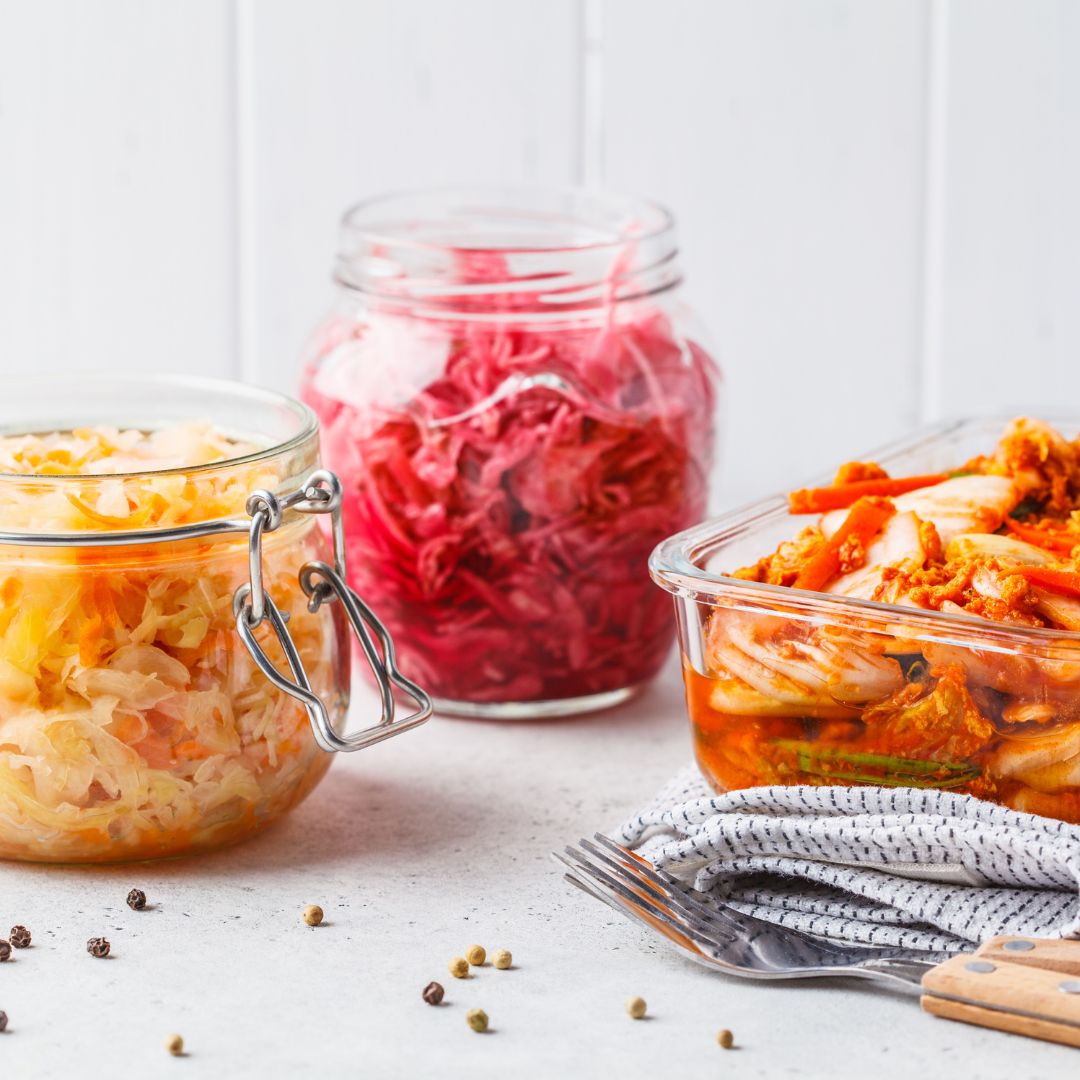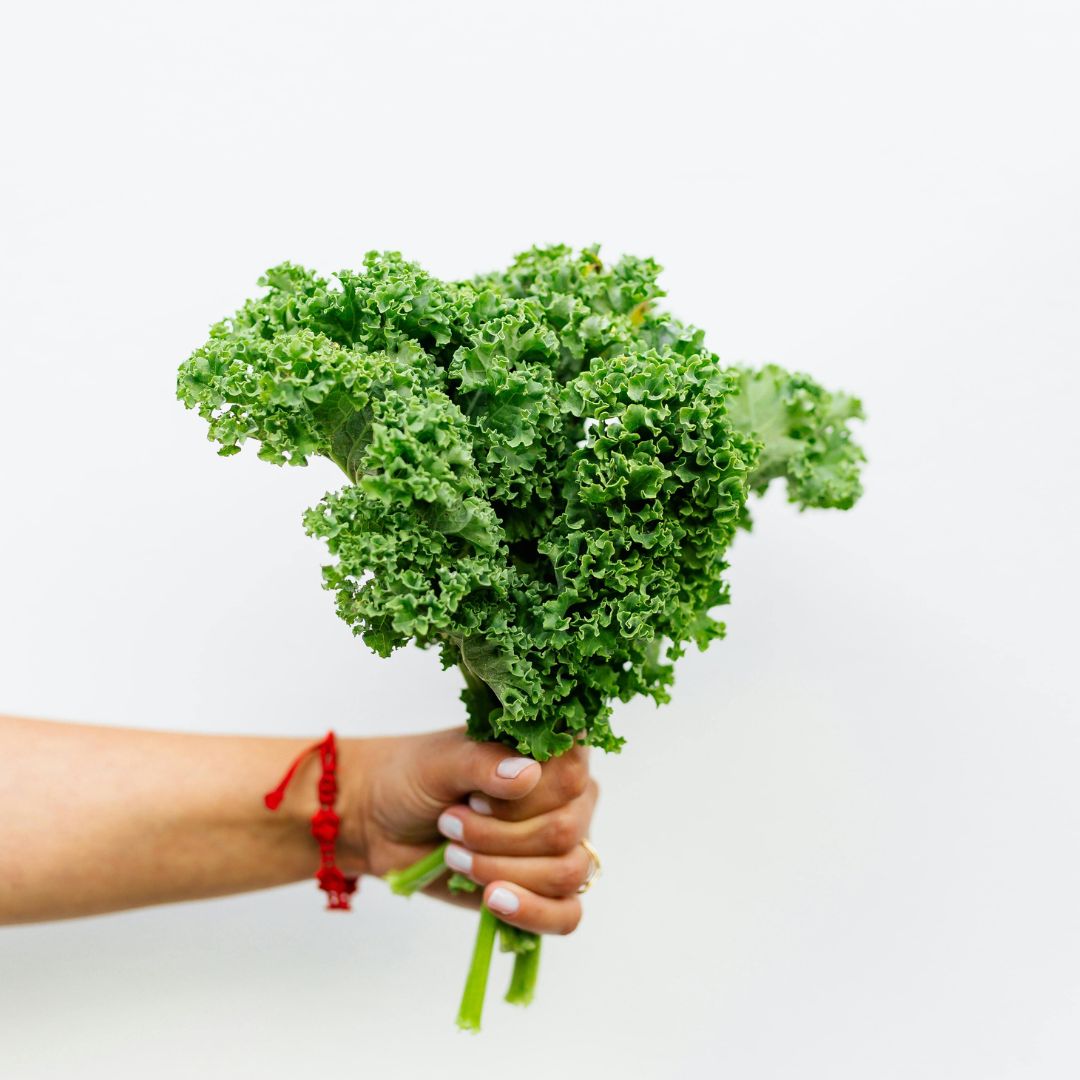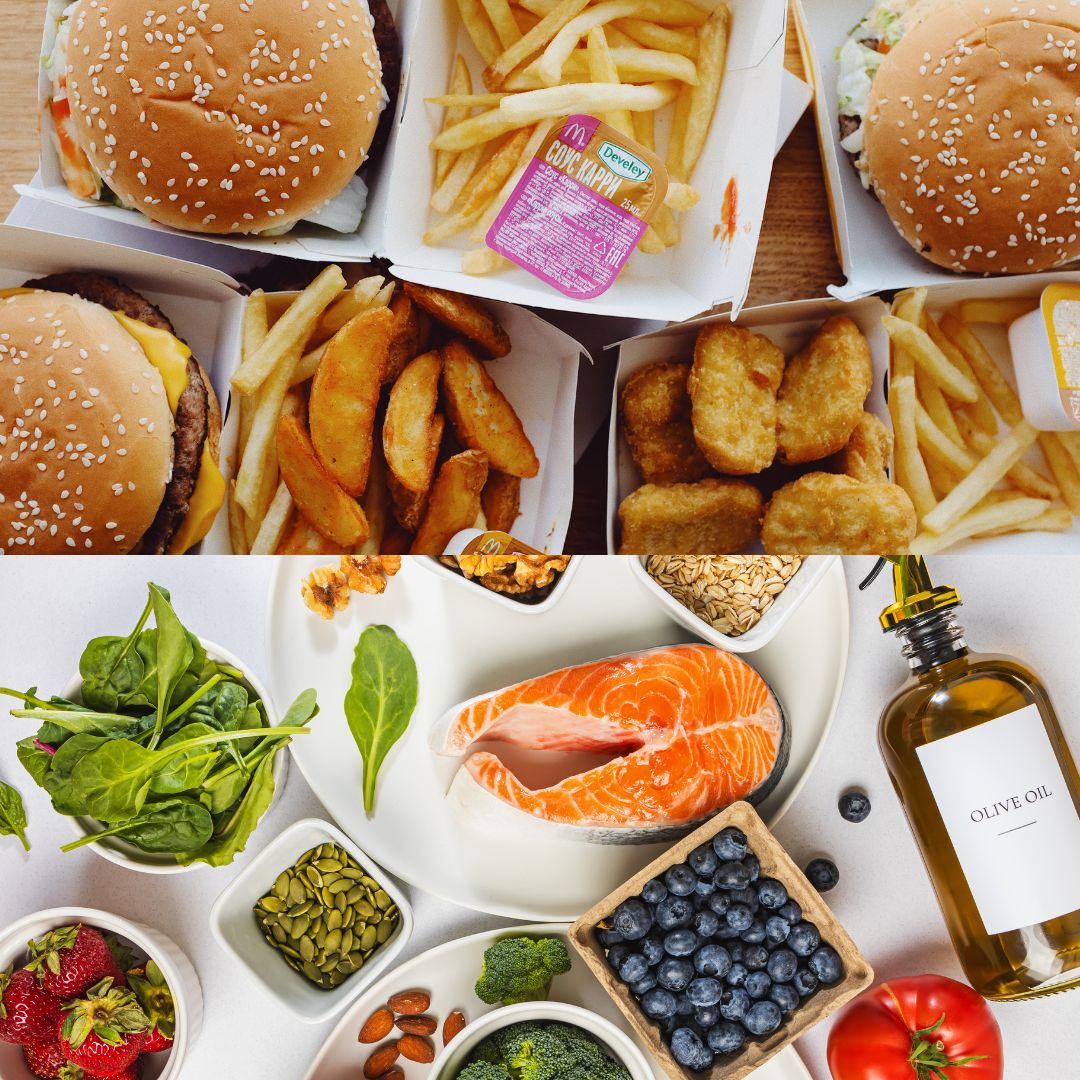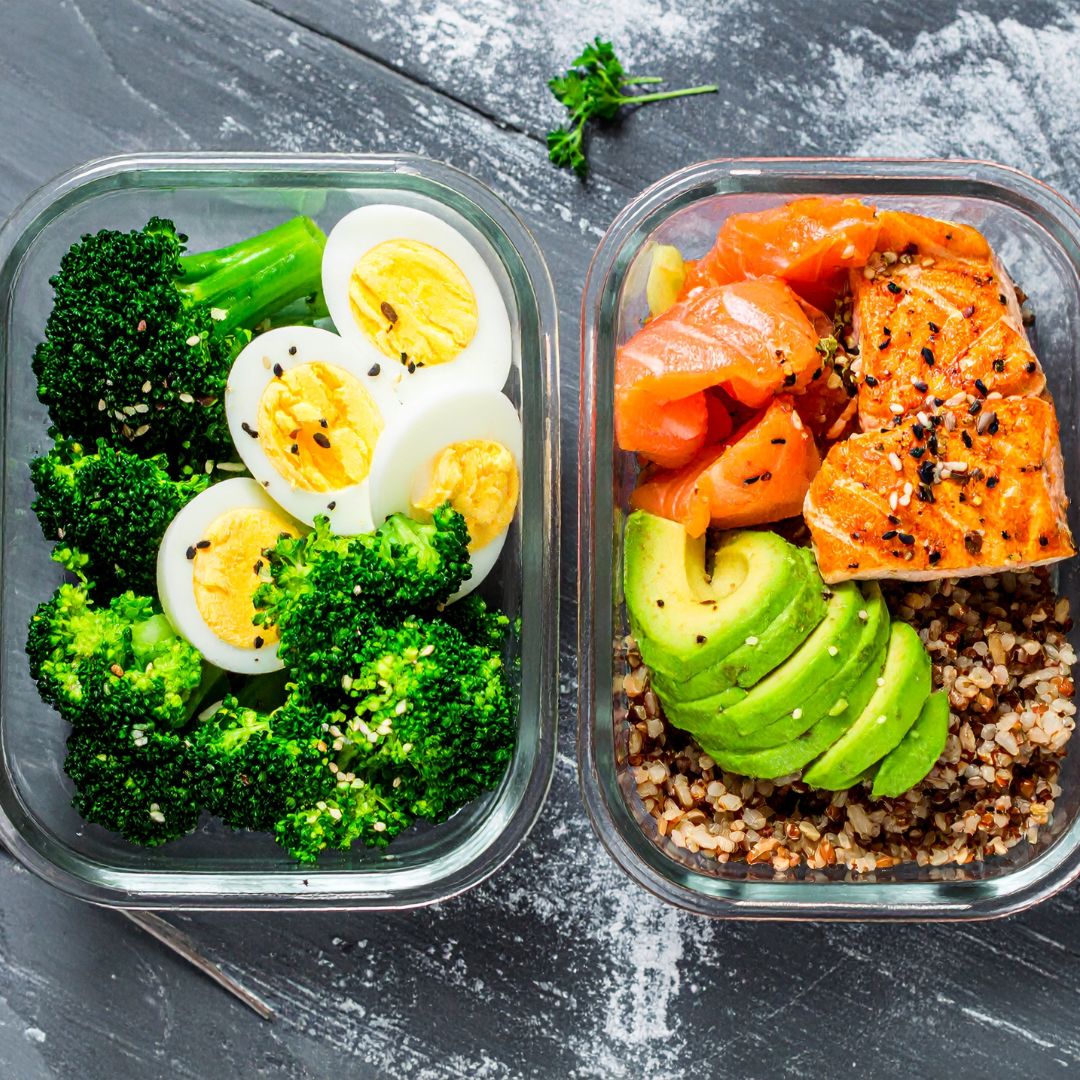
Winter Wellness Starts in the Gut
When winter arrives, many of my clients tell me that they feel more tired, sluggish, and run down. Frequent colds, a flare-up in digestive symptoms, or lingering fatigue can all be signs that your immune system is under extra strain.
What’s less well known is that much of your immune strength actually begins in your gut. Your gut microbiome - that vast community of bacteria, fungi, and other microbes living in your colon - plays a major role in keeping your immune system balanced and responsive.
In this blog, we’ll explore how your gut influences immunity, why microbial diversity matters most during the colder months, and which foods can help to support both your gut and immune resilience this winter.
How Gut Health Shapes Immunity
It’s estimated that around 70% of the body’s immune cells are located in and around the gut wall. This isn’t just coincidence, it’s where your immune system and the outside world meet. Every day, your gut encounters potential pathogens, allergens, and toxins, all of which must be distinguished from harmless food particles or beneficial microbes.
This delicate balance is controlled by a network called the gut-associated lymphoid tissue (GALT). The GALT is responsible for training immune cells to respond appropriately, strong enough to eliminate genuine threats but tolerant enough to avoid excessive inflammation.
When the gut barrier is strong and populated by diverse, beneficial microbes, it sends healthy signals to the immune system, promoting tolerance and repair. When that balance is disrupted, a state known as dysbiosis, communication becomes distorted. The immune system can become either overactive (triggering inflammation, allergies, or autoimmunity) or underactive (leaving you more susceptible to infections).
Research increasingly shows that changes in the gut microbiome can directly influence the effectiveness of immune responses, including how well the body responds to viral infections and vaccines. Seasonal shifts in diet, lifestyle, and stress may all affect this balance, making winter a particularly important time to focus on gut health.
Does any of this sound familiar to you?
Microbiome Diversity and Immune Defence
A healthy gut is a diverse one. Each species of gut microbe plays a unique role in maintaining balance, producing beneficial metabolites, and interacting with the immune system. Reduced microbial diversity, often seen in people with stress, poor diet, antibiotic use, or chronic illness, is associated with lower immune resilience.
One of the most important functions of a diverse microbiome is the production of short-chain fatty acids (SCFAs) such as butyrate, acetate, and propionate. These compounds are made when gut bacteria ferment dietary fibre.
SCFAs help to:
In winter, several factors can reduce SCFA production. People tend to eat fewer plant-based foods and less soluble fibre, which are key fuels for beneficial bacteria.
Cold weather and lower activity can also slow gut motility, altering microbial composition. As SCFA levels fall, the gut barrier becomes more permeable, and low-grade inflammation can increase, leaving the immune system less efficient and more easily fatigued.
A number of recent studies show that individuals with greater microbial diversity and higher SCFA production have lower rates of respiratory infections and recover more quickly when they do get sick. Maintaining a balanced microbiome can therefore provide indirect protection for the lungs, sinuses, and other mucosal surfaces that rely on immune communication with the gut.
Prebiotics and Probiotics Explained
This is an area that many of my clients find confusing – what are we supposed to do? Simply put, supporting gut health in winter often comes down to nourishing beneficial microbes (with prebiotics) and topping up helpful strains (through probiotics).
Prebiotics are types of fibre or resistant starch that your body cannot digest but your gut microbes can. They are fermented in the colon to produce SCFAs, which feed intestinal cells and modulate inflammation. Examples include inulin, fructooligosaccharides (FOS), and galactooligosaccharides (GOS), found naturally in foods such as leeks, onions, garlic, bananas, oats, and Jerusalem artichokes.
Probiotics, on the other hand, are live microorganisms that can help restore microbial balance when consumed regularly in adequate amounts. They act by:
Clinical trials and systematic reviews have found that certain probiotic strains can reduce the risk and duration of upper respiratory tract infections. The benefits are strain-specific and usually appear after consistent use over several weeks.
Often the best choice is to go for food rather than a supplement. Probiotic food sources like live yoghurt, kefir, sauerkraut, kimchi, and fermented vegetables are an excellent place to start, especially when introduced gradually for those with sensitive digestion.
If you find that your gut reacts badly to prebiotic fibres or probiotic foods, it’s worth getting in touch, as this could be a telltale sign of some imbalance in your microbiome – something we can investigate.
Best Foods for a Winter-Proof Gut
In winter, digestion naturally slows, and our food choices often become heavier, starchier, and lower in fibre. The result can be reduced microbial diversity and a weakened gut barrier.
Fortunately, small, consistent changes can have a big impact on gut and immune resilience.
Eat more fibre-rich plants
Aim for a variety of vegetables, fruits, wholegrains, nuts, and seeds each week. Diversity is key: each type of fibre feeds different groups of beneficial bacteria. Soluble fibre, found in oats, carrots, apples, courgettes, and flaxseed, is especially valuable for SCFA production.
Include fermented foods regularly
Incorporate small servings of live yoghurt, kefir, sauerkraut, kimchi, miso, or tempeh. These foods supply live microorganisms and help reinforce the gut barrier. If you’re sensitive to FODMAPs or histamine, start with very small portions and monitor tolerance.
Feed your microbes with prebiotics
Use foods like leeks, garlic, onions, green bananas, and chicory root to feed beneficial bacteria. These can be combined with probiotic foods for a synergistic effect, often called synbiotic eating.
Add polyphenol-rich foods
Brightly coloured plant foods such as berries, red cabbage, beetroot, herbs, and green tea provide polyphenols that act as antioxidants and microbial regulators. These compounds can encourage the growth of beneficial species like Akkermansia muciniphila and Bifidobacteria.
Stay hydrated and support motility
Hydration is often overlooked in winter when thirst cues are weaker. Adequate water intake supports regular bowel movements, ensuring waste and microbial metabolites move efficiently through the colon. Gentle daily movement, warmth, and fibre all help stimulate healthy peristalsis.
Mind the stress–gut link
Winter often brings more psychological stress, which can suppress the vagus nerve and slow digestion. Mindful eating, deep breathing, and restorative sleep all support the parasympathetic “rest and digest” state that keeps your gut working optimally.
If your gut feels out of balance this winter - with bloating, irregular digestion, or increased fatigue - it may be a sign your microbiome needs more support. By nurturing your gut, you’re also building a stronger foundation for your immune health, mood, and energy.
Or, if you’re interested in finding out more via microbiome testing, why not book a free call?

Winter Immunity: The Nutrients That Really Work
You may notice that as soon as all the kids are back in school, everyone is coming down with something. Or, you might find that every year when you finish work for Christmas, you all come down with the flu. Why is this happening? And what can we do about it?
When the weather turns colder, shorter daylight hours can leave many of us feeling completely run down. You may find yourself catching more colds, feeling more tired, or noticing that your gut feels more unsettled - all of which can affect our immune resilience.
The good news is that there are things we can do with our food that can strengthen our body’s defences. This blog explores why immunity tends to decline in winter and which nutrients have the strongest scientific backing for supporting immune health.
Why Immunity Declines in Winter
There are several reasons why winter puts extra pressure on your immune system.
Reduced sunlight and vitamin D synthesis
From October to March in the UK, the sun’s rays are too weak for the skin to produce enough vitamin D. The process depends on ultraviolet B (UVB) light converting a cholesterol compound in the skin (7-dehydrocholesterol) into vitamin D3. So, winter is a time of year when the sun is low in the sky and people are spending more time indoors, therefore production effectively shuts down.
Research shows that average vitamin D levels fall steadily through winter and early spring. This is a particular issue for people with darker skin tones, because higher levels of melanin reduce the skin’s ability to synthesise vitamin D from sunlight. People of South Asian, African, or Caribbean heritage are therefore at higher risk of deficiency in the UK climate, and maintaining good status often requires dietary supplementation. Older adults, people who cover their skin for cultural or medical reasons, or those with gut absorption issues are also more likely to have low vitamin D.
More time indoors
As temperatures drop, we spend more time inside in close proximity to others.
This makes it easier for respiratory viruses to spread, especially when windows are closed and air circulation is poor. Cold, dry air may also help viruses survive longer in the environment.
Lifestyle and digestive changes
Shorter days can disrupt sleep and mood, both of which directly influence gut motility and digestive secretions through the gut–brain axis. Reduced sunlight lowers serotonin levels, and since serotonin helps regulate intestinal movement, this can slow digestion and may lead to bloating or constipation.
People often move less and drink less water in winter, which reduces the mechanical stimulation of the gut and slows peristalsis. Colder weather can also shift food choices toward heavier, starchier meals and fewer fresh fruits and vegetables, reducing fibre intake and microbial diversity.
Meanwhile, chronic low-grade stress – common during darker months – can activate the sympathetic nervous system thereby suppressing the “rest and digest” parasympathetic response. This leads to lower stomach acid and digestive enzyme secretion, which can reduce nutrient absorption. Together, these factors make digestion feel slower and less efficient, particularly in those already prone to gut symptoms.
And, because around 70% of immune cells are located in or around the gut wall, any disruption to digestion and gut barrier function can weaken immune regulation, leaving the body more vulnerable to infection and inflammation.
Key Nutrients for A Resilient Immune System
But it’s not all bad news! There are several things that we can do to support our immune system over these cold, wintry months. Here are the most evidence-based:
Vitamin D and Immune Defence
Vitamin D acts more like a hormone than a vitamin, influencing over 200 genes, many of which are involved in immune regulation.
Immune cells carry vitamin D receptors, allowing vitamin D to influence how they behave. It helps maintain the integrity of epithelial barriers (such as the linings of the lungs and the gut), encourages the production of antimicrobial peptides that directly fight pathogens, and supports a balanced immune response - strong enough to defend, but not so strong that it triggers excess inflammation.
Why winter matters
During the darker months, vitamin D synthesis from sunlight is negligible across the UK. Dietary sources are limited, and deficiency is common in people who spend little time outdoors or have darker skin. Low levels have been linked with increased susceptibility to respiratory infections and slower recovery.
While research findings are mixed, studies consistently show that those who start winter with low vitamin D tend to benefit most from supplementation. The evidence suggests that steady, daily doses are more effective than occasional high doses. In the UK, public health guidance recommends everyone take a 10 µg (400 IU) daily vitamin D supplement between October and March, with some people needing higher amounts under clinical supervision.
Zinc
Zinc is critical for the development and activity of immune cells. It helps regulate inflammation, supports wound healing, and is essential for maintaining the integrity of the skin and mucous membranes - our first physical barriers to infection.
Even mild zinc deficiency can impair immune function. Several randomised controlled trials have shown that zinc lozenges, when taken within 24 hours of the onset of cold symptoms, can shorten duration by a few days. The effect depends on the formulation and dose: lozenges that provide more than 75 mg elemental zinc per day, taken for short periods, appear most effective.
Good dietary sources include shellfish, beef, lamb, cheese, pumpkin seeds, and wholegrains. Because high intakes can interfere with copper absorption, long-term supplementation should not be done without supervision.
Vitamin C
Vitamin C is one of the body’s main antioxidants and plays an essential role in immune defence. It supports the function of white blood cells, enhances the activity of natural killer cells, and protects immune cells from oxidative stress during infection. It also helps maintain the integrity of those epithelial barriers, including the gut and lungs.
While daily supplementation with vitamin C does not seem to prevent colds in the general population, it can modestly reduce their duration and severity. People under physical stress, such as athletes or those with higher oxidative load, may benefit more.
Regular intake of vitamin C-rich foods - citrus fruits, kiwi, berries, peppers, and cruciferous vegetables - remains the best approach for most people.
Selenium
Selenium is a trace mineral needed to produce selenoproteins, enzymes that protect immune cells from oxidative damage. It helps control inflammation, supports the production of antibodies, and assists in the clearance of pathogens.
In regions with low selenium soil levels, such as parts of Europe, sub-optimal intake may be more common. Deficiency has been associated with reduced immune responses and more severe infections.
Most people can maintain good levels by eating selenium-rich foods such as Brazil nuts (just one or two per day), eggs, tuna, sardines, and wholegrains.
Probiotic foods and the Gut–Immune Axis
Around two-thirds of immune activity originates in or around the gut. The gut microbiota plays a vital role in training and regulating immune responses. When the balance of gut bacteria is disrupted, for example, after antibiotics or periods of high stress, the immune system can become either sluggish or over-reactive.
Several meta-analyses have found that specific probiotic strains can reduce the risk or duration of upper respiratory tract infections, particularly in children and older adults. Benefits are strain-specific and depend on regular intake.
Fermented foods such as live yoghurt, kefir, sauerkraut, and kimchi can contribute to microbial diversity. Always check with a nutritionist before embarking on probiotic supplementation, as it is important to pick the right strain.
Everyday Food Sources of Immune Nutrients
You can support immune resilience through simple, whole-food choices:
For those of us with gut symptoms, make sure to introduce higher-fibre or fermented foods gradually and support digestion with mindful eating and adequate hydration.
If you find that you’re frequently run down in winter or struggle with fatigue and gut symptoms, it may be time to review your nutrient intake and gut–immune balance. Book a free 30-minute call with me, and we can talk through options to support your energy, gut health, and immune strength through the colder months.

Diabetes - What You Should Know About Diagnosis & Prevention
Every November, Diabetes Awareness Month highlights one of the UK’s fastest-growing health challenges. More than 5.8 million people in the UK are living with diabetes, and an estimated 850,000 remain undiagnosed (Diabetes UK, 2024).
Understanding the condition, recognising the signs, and knowing when to speak to your GP can make a real difference to long-term health.
What Is Diabetes?
Diabetes is a condition where blood sugar (glucose) levels become too high because the body can’t use insulin effectively or doesn’t produce enough of it.
T2D is the most common form, and its onset is often gradual. Many people live with pre-diabetes (also known as non-diabetic hyperglycaemia) for years without knowing.
Unchecked, high blood sugar can lead to complications such as heart disease, nerve damage, eye or kidney issues, which is why early detection and preventive lifestyle steps are so important.
How Your GP Tests for Diabetes
If you notice frequent thirst, increased urination, tiredness, blurred vision or slow-healing wounds, it’s worth discussing these symptoms with your GP.
Typical UK diagnostic tests include:
If results are raised but below diabetic range, you may be told you have pre-diabetes and offered monitoring or referral to the NHS Diabetes Prevention Programme (NDPP).
The UK National Screening Committee currently does not recommend universal screening for type 2 diabetes, but GPs are encouraged to test those with risk factors such as family history, high blood pressure, or overweight (UK NSC 2023).
Can Type 2 Diabetes Be Hereditary?
Yes, genetics can influence your risk, but it’s not destiny. Having a close relative (parent, brother or sister) with type 2 diabetes increases your likelihood two- to six-fold compared with someone without that history (Diabetes UK, 2023). This happens because genes affecting insulin production and glucose metabolism can be inherited, but environment and lifestyle still play the largest role.
Regular activity, balanced eating, maintaining a healthy waist circumference, and not smoking all help offset this inherited risk.
Evidence That Prevention Works
Strong UK evidence shows that type 2 diabetes can often be delayed or even prevented:
Lifestyle Strategies Beyond Nutrition
While food choices are key, several other areas influence blood sugar and metabolic health:
1. Movement and Exercise
Even modest daily activity improves how muscles use glucose. Both aerobic exercise (like brisk walking or cycling) and strength training enhance insulin sensitivity.
Breaking up long periods of sitting is also beneficial. Weight training is essential to helping improve insulin sensitivity too.
2. Sleep Quality
Consistently getting less than seven hours’ sleep can impair glucose control.
Prioritise a regular bedtime, reduce evening screen time, and keep the bedroom dark and cool.
3. Stress Management
Chronic stress raises cortisol, a hormone that can elevate blood sugar.
Mindfulness, deep breathing, time in nature, or supportive conversations all help moderate stress responses.
4. Weight and Body Composition
Even a 5–10 % reduction in body weight can significantly improve blood sugar control. Focus on building muscle through gentle resistance exercise and balanced protein intake.
5. Regular Check-ups
For those living with diabetes, the annual review offered by the NHS includes checks for HbA1c, blood pressure, cholesterol, kidney and foot health, all vital for preventing complications (NHS Diabetes Care Processes, 2024).
For everyone else, periodic health checks for blood pressure, waist circumference, and glucose levels can help spot early warning signs.
Taking Action This Diabetes Awareness Month
Diabetes prevention isn’t about perfection - it’s about awareness and steady change. This November, consider booking a routine health check, reviewing your lifestyle habits, and learning more about how small steps protect long-term health.
Explore related topics in:
If you’d like personalised support to improve your energy and metabolic health, book a Blood Sugar Balance Consultation.
Disclaimer: This blog is for general educational purposes only and should not replace medical advice. Always consult your GP or healthcare provider before making changes to your diet, medication or lifestyle.

Autumn One Pot Wonder
As the weather turns cooler, there’s something deeply satisfying about a warming one-pot meal. Especially when it’s rich in fibre, packed with seasonal veg, and balanced with enough protein to keep you full for all day.
This recipe delivers around 30 g of protein and over 10 g of fibre per serving. It’s simple to prepare, freezes really well, and works beautifully with autumn ingredients like carrots, swede, kale and leeks.
Why Fibre and Protein Keep You Fuller Longer
Fibre slows the rate at which food leaves the stomach, helping to regulate blood sugar and prevent energy crashes. Protein adds staying power by moderating appetite hormones such as ghrelin.
Serves 2
You can make either the beef or vegetarian version using the same base.
Base Ingredients (for both versions)
Beef Version
Method
Veggie Version
Method
Swaps for Seasonal Flexibility
For more balanced, real-food recipes, visit the Recipe Index.

Ultra-Processed Foods: The Hidden Driver of Weight Gain and Low Energy
Have you ever felt that certain foods actually make you hungrier, less energised, or more prone to snacking? You are not imagining it! The modern food environment is dominated by ultra-processed foods - or UPFs - and they’re quietly influencing how we eat, how full we feel, and how our metabolism functions.
Recent public attention, including Dr Chris van Tulleken’s book Ultra-Processed People and BBC documentary work, has helped reveal what some scientists have known for years: diets high in UPFs are strongly linked to weight gain, poor blood sugar control, and rising rates of metabolic disease.
What Counts as Ultra-Processed?
The term ultra-processed food comes from the NOVA classification, a system developed by Brazilian researchers to categorise foods based on how much they’ve been changed from their original form.
UPFs typically include products made mostly or entirely from industrial ingredients, such as refined starches, oils, sweeteners, flavour enhancers and emulsifiers, with little or no recognisable whole food remaining.
Examples include:
They’re designed to be convenient, tasty and affordable, but they’re also engineered to keep us coming back for more!
How UPFs Affect Blood Sugar and Cravings
UPFs are often rapidly digested and low in fibre, which causes quick spikes in blood sugar and insulin. These sharp rises are usually followed by a sudden drop, leaving you tired, hungry and craving something sweet or starchy again a few hours later.
In a landmark study at the U.S. National Institutes of Health, participants who ate an ultra-processed diet for two weeks consumed around 500 extra calories per day compared to those on a minimally processed diet, despite being offered the same foods in terms of calories, salt and macronutrients. They didn’t mean to overeat; the texture, speed of eating, and reduced satiety simply made it happen.
As van Tulleken points out, many UPFs are “food-like products” that activate the brain’s reward centres more powerfully than traditional foods. This makes moderation difficult, especially when you’re busy, tired or stressed.
The Link Between UPFs and Weight Gain
While no single food causes weight gain on its own, diets dominated by ultra-processed foods are strongly associated with higher body weight, insulin resistance, and metabolic syndrome. The combination of high energy density, poor nutrient quality, and altered appetite signalling creates a perfect storm for metabolic stress.
Long-term studies have linked high UPF intake with an increased risk of type 2 diabetes, heart disease, depression and even premature death. These effects aren’t just about calories, they relate to how UPFs disrupt hormones such as insulin, ghrelin and leptin, which control appetite and fullness.
Why UPFs Are Hard to Avoid
Around 60% of the average UK diet now comes from UPFs, making avoidance almost impossible. They’re absolutely everywhere - in workplaces, cafés, and supermarkets - marketed as “healthy” or “low-fat”, but often loaded with artificial sweeteners, additives, emulsifiers, or refined grains.
For many clients I see, this leads to confusion and frustration: “I’m eating low-fat yoghurt and wholegrain cereal, so why do I still feel tired and hungry all the time?” The answer often lies in food quality and processing level, not the calorie content.
Simple, Sustainable Food Swaps
Completely cutting out UPFs isn’t realistic for most people and it doesn’t have to be. The aim is to shift the balance towards more whole, minimally processed foods that keep blood sugar stable and support energy and mood.
A few easy swaps:
These small changes add up quickly, improving satiety and naturally reducing cravings, without the need for restriction or “detoxing”.
If you’re curious about how to reduce UPFs in your diet, but worried about the cost, check out my blog, Eat Well, Spend Less for more info.
For practical meal inspiration, visit the recipe section of the blog page for balanced, easy-to-prepare dishes that use real, nutrient-dense ingredients.
Next Steps
Reducing ultra-processed foods isn’t about perfection, it’s about awareness. Understanding how they affect your metabolism and mood allows you to make better choices, even in small steps.
If you’d like ongoing support, recipe ideas and tips for sustainable eating, join my free, private Facebook group where I share regular insights to help you build lasting habits for longterm health and wellbeing.
Disclaimer: This blog is for general educational purposes only and is not a substitute for medical advice. Please consult your GP or healthcare provider before making changes to your diet, supplements or medication.

Insulin Resistance and Midlife Weight Gain: Why Blood Sugar Balance Matters
If you feel like you’re doing everything right, but your energy still dips mid-afternoon or the scales won’t budge, insulin resistance could be playing a role. It’s one of the most overlooked factors in midlife weight gain and fatigue, but it’s also one that can respond really well to nutrition and lifestyle changes.
What Is Insulin Resistance?
Insulin is a hormone made by the pancreas that helps move glucose (sugar) from your bloodstream into your cells, where it’s used for energy. Over time, especially when the diet is high in refined or ultra-processed foods, your cells can become less responsive or deaf to insulin’s signal. The pancreas compensates by producing more insulin, but chronically high insulin can encourage fat storage, particularly around the middle, and lead to erratic energy and cravings.
Insulin resistance is increasingly common in our 40s and 50s. It isn’t a disease, but a sign that the body’s metabolism needs support. The earlier it’s addressed, the easier it is to rebalance.
Signs and Symptoms to Watch For
Insulin resistance often develops gradually and can go unnoticed for years. Common indicators include:
These symptoms don’t diagnose insulin resistance but can indicate that your blood sugar regulation needs support. Discuss any concerns with your GP and request appropriate testing if needed.
How Nutrition Can Support Insulin Sensitivity
Nutrition plays a central role in how our cells respond to insulin. Meals that combine protein, fibre and healthy fats slow the release of glucose into the bloodstream, helping to keep energy levels steady and reduce cravings.
For most people, this isn’t about cutting out all carbohydrates, it’s about choosing the right ones. Whole, minimally processed foods with natural fibre and texture support both blood sugar balance and gut health.
Lifestyle factors matter too. Regular movement, particularly strength or resistance training, encourages muscles to absorb glucose more efficiently. Prioritising sleep and managing stress can also prevent the cortisol spikes that make blood sugar harder to control.
If you’d like to explore how these principles apply to midlife, read my related post on Balancing Blood Sugar in Midlife.
Foods That Improve Insulin Response
A few small dietary shifts can have a big impact on insulin sensitivity and overall metabolic health:
A balanced plate might look like grilled salmon with quinoa and broccoli - a simple, nutrient-dense combination that supports steady energy and hormone balance - see image above.
Taking the Next Step
If sugar cravings, fatigue or weight gain feel familiar, it may be time to look beyond willpower and consider what’s might be happening with your blood sugar balance.
Addressing insulin resistance early can transform energy levels, appetite regulation and long-term metabolic health.
You can learn more about building Metabolic Resilience in my post here or book a Blood Sugar Balance Consultation to explore personalised nutrition and lifestyle strategies that work for you.
Disclaimer: This blog is for general educational purposes only and is not a substitute for medical advice. Please consult your GP or healthcare provider before making changes to your diet, supplements or medication.
![]()
Please get in touch and find out more - I offer a free 30-minute exploratory call.